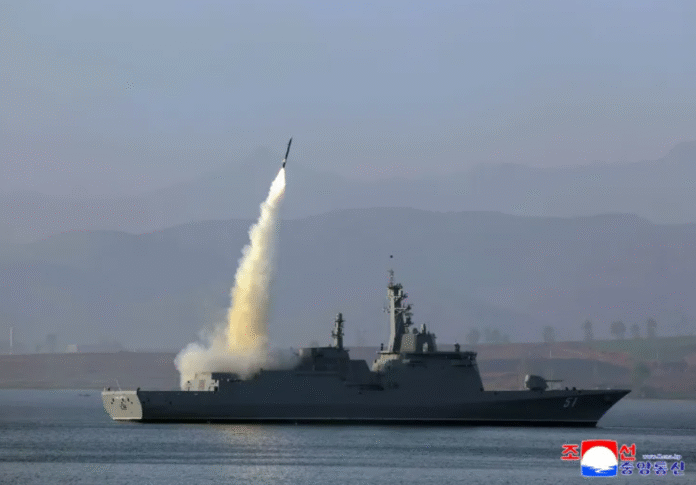Kim Jong Un Nuclear Expansion Threat Amid US-South Korea Drills
Kim Jong Un nuclear threats are once again dominating international headlines after the North Korean leader vowed to speed up the expansion of Pyongyang’s nuclear arsenal. His statement comes in direct response to ongoing United States-South Korea joint military drills, which he labeled as a sign of “hostile intent.”
According to state media, Kim Jong Un made these remarks while visiting a newly developed naval destroyer, emphasizing the urgent need to “rapidly expand” North Korea’s nuclear weapons program. He also accused Washington and Seoul of including “nuclear elements” in the drills, suggesting they were designed to provoke war.
This development raises fresh concerns over global security, as it adds more fuel to an already volatile situation on the Korean Peninsula.
US-South Korea Joint Drills Spark Kim Jong Un Nuclear Response
The annual Ulchi Freedom Shield exercises began earlier this week, involving large-scale field maneuvers and simulated combat operations. The drills are scheduled to last 11 days, with nearly half of the 40 field training activities postponed until September.
South Korea insists that these drills are purely defensive, yet North Korea perceives them differently. Pyongyang has a long history of condemning such exercises, frequently responding with missile launches or weapons tests.
South Korea’s President Lee Jae Myung has tried to reduce tensions by adjusting parts of the exercise schedule, but analysts believe Pyongyang is unlikely to respond positively. For North Korea, such exercises are consistently portrayed as “war rehearsals.”
Kim Jong Un Nuclear Strategy and Refusal to Denuclearize
Experts argue that Kim Jong Un’s nuclear strategy signals North Korea’s unwillingness to denuclearize. Instead, Pyongyang appears determined to upgrade its weapons capabilities irreversibly.
Hong Min, a senior analyst at the Korea Institute for National Unification, explained:
“Through this move, North Korea is demonstrating its refusal to accept denuclearization and the will to irreversibly upgrade nuclear weapons.”
This stance places further pressure on upcoming talks between US President Donald Trump and South Korean President Lee in Washington, where curbing Pyongyang’s nuclear ambitions will remain a key issue.
How Many Nuclear Weapons Does North Korea Have?
According to research by the Federation of American Scientists (FAS), North Korea has likely produced enough fissile material for up to 90 nuclear warheads. However, experts estimate that only about 50 nuclear warheads may actually be assembled and operational.
This growing arsenal, combined with advances in delivery systems such as intercontinental ballistic missiles (ICBMs) and submarine-launched missiles, heightens global fears of North Korea’s strike capabilities.
Kim Jong Un Nuclear Ambitions Go Beyond Warheads
While nuclear weapons remain central to Pyongyang’s defense strategy, Kim Jong Un is also expanding North Korea’s naval power.
Reports from the Korean Central News Agency (KCNA) revealed that the regime plans to complete construction of a third 5,000-tonne Choe Hyon-class destroyer by October next year. Additionally, Pyongyang has been actively testing cruise missiles and anti-air defense systems for these vessels.
Such advancements point to Kim’s larger ambition: to project North Korea’s military influence beyond its borders, challenging the naval supremacy of regional powers such as South Korea, Japan, and even the United States.

International Reactions to Kim Jong Un Nuclear Threats
Global reactions to Kim Jong Un’s nuclear rhetoric have been swift.
-
United States: Washington reaffirmed that the exercises with Seoul are defensive in nature. US defense officials also emphasized their readiness to counter any “provocative actions” by North Korea.
-
South Korea: Seoul expressed regret over Pyongyang’s hostile tone, urging the North to return to dialogue rather than escalating tensions.
-
Japan: Tokyo, already alarmed by past North Korean missile tests that flew over its territory, has called for stronger regional cooperation to counter Pyongyang’s nuclear program.
-
United Nations: UN officials have once again urged restraint, highlighting the devastating humanitarian impact that renewed conflict could bring to the Korean Peninsula.
Why the Kim Jong Un Nuclear Threat Matters Globally
The importance of Kim Jong Un’s nuclear ambitions extends far beyond Northeast Asia. Every time North Korea threatens to expand its arsenal, it risks:
-
Triggering an arms race in the region, prompting South Korea and Japan to strengthen their own military capabilities.
-
Straining US-China relations, as Beijing remains Pyongyang’s main ally while Washington leads global opposition.
-
Destabilizing international trade routes, particularly in the South China Sea and Pacific waters, where naval tensions could disrupt shipping lanes.
-
Threatening global non-proliferation efforts, as other states may question the effectiveness of existing nuclear treaties.
Kim Jong Un Nuclear Escalation: What Comes Next?
The world now waits to see how Kim Jong Un will act beyond words. Historically, North Korea often follows up such statements with missile tests, sometimes even timed to coincide with international summits or diplomatic events.
Analysts believe Pyongyang could conduct:
-
A long-range ballistic missile test to demonstrate progress.
-
Submarine-launched missile tests to highlight its growing naval strength.
-
More short-range missile launches to intimidate South Korea and Japan.
Given North Korea’s track record, these scenarios remain highly possible in the coming weeks.

